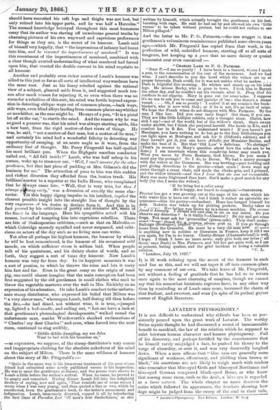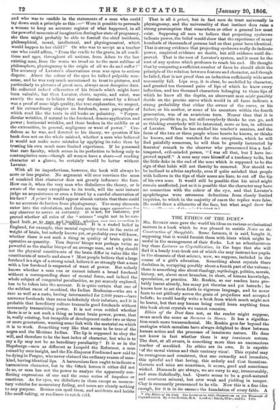LAVATER'S PHYSIOGNOMY.*
IT is not difficult to understand why ridicule has been so per- sistently poured upon the great work of Lavater. The worthy Swiss mystic thought he had discovered a secret of immeasurable benefit to mankind, the law of the relation which he supposed to exist between human character and human physiognomy. . Full of his discovery, and perhaps fortified by the consciousness that he himself rarely misjudged a face, he pushed his theory to the verge of absurdity, or over it, and was very deservedly laughed down. When a man affirms that " blue eyes are generally more significant of weakness, effeminacy, and yielding than brown or black," his assertions are not likely to weigh much with readers who remember that blue-eyed Goth and blue-eyed Northman and blue-eyed German conquered black-eyed Rome, or who know that among some races, such as the Arab, a blue eye is regarded as a lusus nature;. The whole chapter on noses deserves the satire which followed its appearance, the brochure showing how dogs might be judged from the sweep of the curl in their tails,, • Larater's Physiognomy. New Edition. London: W. Tozg. and who was to confide in the statements of a man who could lay down such a principle as this :—" Were it possible to persuade a woman to keep an accurate register of what happened, in all the powerful moments of imagination duringher state of pregnancy, she then might probably be able to foretell the chief incidents, philosophical, moral, intellectual, and physiognomical, which would happen to her child?" Or who was to accept as a teacher one who could affirm, " From the cradle to the grave, in all condi- tions and ages, throughout all nations, from Adam to the last existing man, from the worm we tread on to the most sublime of philosophers, physiognomy is the origin of all we do and suffer?" The accuracy of Lavater's observations even was open to serious dispute. About the colour of the eyes he talked palpable non- sense, and he was very much accustomed to trust to pictures, and particularly to pictures of great men, always most deceptive data. He collected indeed silhouettes of his friends which might have been valuable, but then Lavater, cleric, mystic, and saint, was exactly the man to believe that any feature owned by a friend was a proof of some high quality, the true explanation, we suspect, of his extraordinary chapter on foreheads, some paragraphs of which read like the texts in old books on palmistry. " Perpen- dicular wrinkles, if natural to the forehead, denote application and power ; horizontal wrinkles, and those broken in the middle or at the extremities, in general, negligence or want of power." Cre- dulous as he was, and devoted to his theory, we question if his
book does not on the whole mislead, whether a man who believed it would not make more mistakes by applying its rules than by trusting his own much more limited experience. If he possessed that rare faculty, which seems in its perfection to belong only to contemplative men—though all women have a share—of reading character at a glance, he certainly would be better without Lavater.
With all its imperfections, however, the book will always be more or less popular. No argument will ever convince the mass of mankind that character does not greatly influence the face.
How can it, when the very man who disbelieves the theory, or is aware of the many exceptions to its truth, will the next instant
judge an acquaintance or even a friend by a careful observation of his face ? A priori it would appear almost certain that there could be no accurate deduction from physiognomy. Too many elements enter into the calculation, and there are too many greet-aim,. any observer to arrive at certainty. it is not, for instance, yet proved whether all rules of the " science " ought not to be con- fined both as .,,t9 any "no o....klon srigadOdOliliaTaher is a rooted belief in England, for example, that mental capacity- varies in the ratio of weight of brain, but nobody knows yet, or probably ever will know,
whether there is not such a thing as quality of brain quite as operative as quantity. Tom Sayers' biceps was perhaps twice as powerful as the similar biceps of an average man, and why should not the physical constituents of the brain differ in value like the constituents of muscle and sinew ? Most people believe that a large forehead is a sign of a strong mind, believe it so strongly that a man with a low forehead is suspected of want of power. But nobody knows whether a man can or cannot inherit a broad forehead without a corresponding share of mental force, and indeed the whole subject of congenital peculiarities, as yet scarcely explored, has to be taken into the account. It is quite certain that one of the subtlest races of mankiud, the Indian Brahmins—who are a race as well as a caste, having intermarried for 2,000 years—have narrower foreheads than races indefinitely their inferiors, and it is probable that hereditary culture transmits good foreheads without necessarily transmitting power. It is not even settled whether there is or is not such a thing as latent brain power, power, that is, really existing, but incapable of development under two or three or more generations, wanting some link with the material on which it is to work. Something very like that seems to be true of the negro and the Mexican Indian. The lip is supposed to obey the will, and therefore to be the best index of character, but who is to say a lip may not be an hereditary peculiarity ? It is so in the Hapsburgs—men as different as Leopold the Reformer, a man ruined by over insight, and the Ex-Emperor Ferdinand now said to be dying in Prague, who never claimed the ordinary reason of man- kind, having identical lips. A harmonious face ought to indicate a harmonious character, but in the Greek heroes it either did not do so, or man has not the power to analyze the apparently con- !dieting expressions of one and the same series of impulses or emotions. As for eyes, we disbelieve in them except as momen- tary vehicles for momentary feeling, and noses are clearly nothing to any purpose. Bruises can spoil them, and accidents and habits like snuff-taking, or readiness to catch cold. That is all a priori, but in fact men do trust universally in physiognomy, and the universality of that instinct does raise a strong presumption that somewhere or other a general law must exist. Supposing all men to believe that projecting eyebrows indicate power, the belief would show that the experience of many hundreds of thousands of persons had on that point been identical. That is strong evidence that projecting eyebrows really do indicate power, empirical evidence no doubt, but still evidence until dis- proved. That is the root of Lavater's system, and it must be the root of any system which professes to reach his end. He thought that by comparing a sufficient number of faces he should elicit the principle of the relation between feature and character, and though he failed, that is not proof than an induction sufficiently wide must necessarily fail. Lips mug, it is clear, be modelled by character, and granted ten thousand pairs of lips of which he knew every inflection, and ten thousand characters belonging to those lips of which he knew all the depths, an observant man might possibly decide on the precise curve which would in all faces indicate a strong probability that either the owner of the curve, or his father, or his mother, or some of his ancestors within the fourth generation, was of an avaricious turn. Nearer than that it is scarcely possible to go, but still everybody thinks he can go, and so thinking everybody will be interested, more or less, in editions of Lavater. When he has studied his teacher's maxims, and the faces of the two or three people whose hearts he knows, or thinks he knows, and then watched for the exceptions, which he will find painfully numerous, he will then be greatly instructed by Socrates' remark to the observer who pronounced him a bad- tempered, evil-minded person, " I was all that, but I have im- proved myself." A man may cure himself of a tendency to lie, but the little doke in the end of the nose which is supposed to be the sign of that habit will not thereby be removed. Nor should we be inclined to advise anybody, even if quite satisfied that people with hollows in the tips of their noses are liars, to cut off the tip of his own nose. It would still be possible that his mind might remain unaffected, just as it is possible that the character may have no connection with the colour of the eye, and that Lavater's apophthegms were erroneous deductions from closely limited inquiries, to which in the majority of cases the replies were false. He could draw a silhouette of the face, but what angel drew for
t.:— -5 at.- r































 Previous page
Previous page